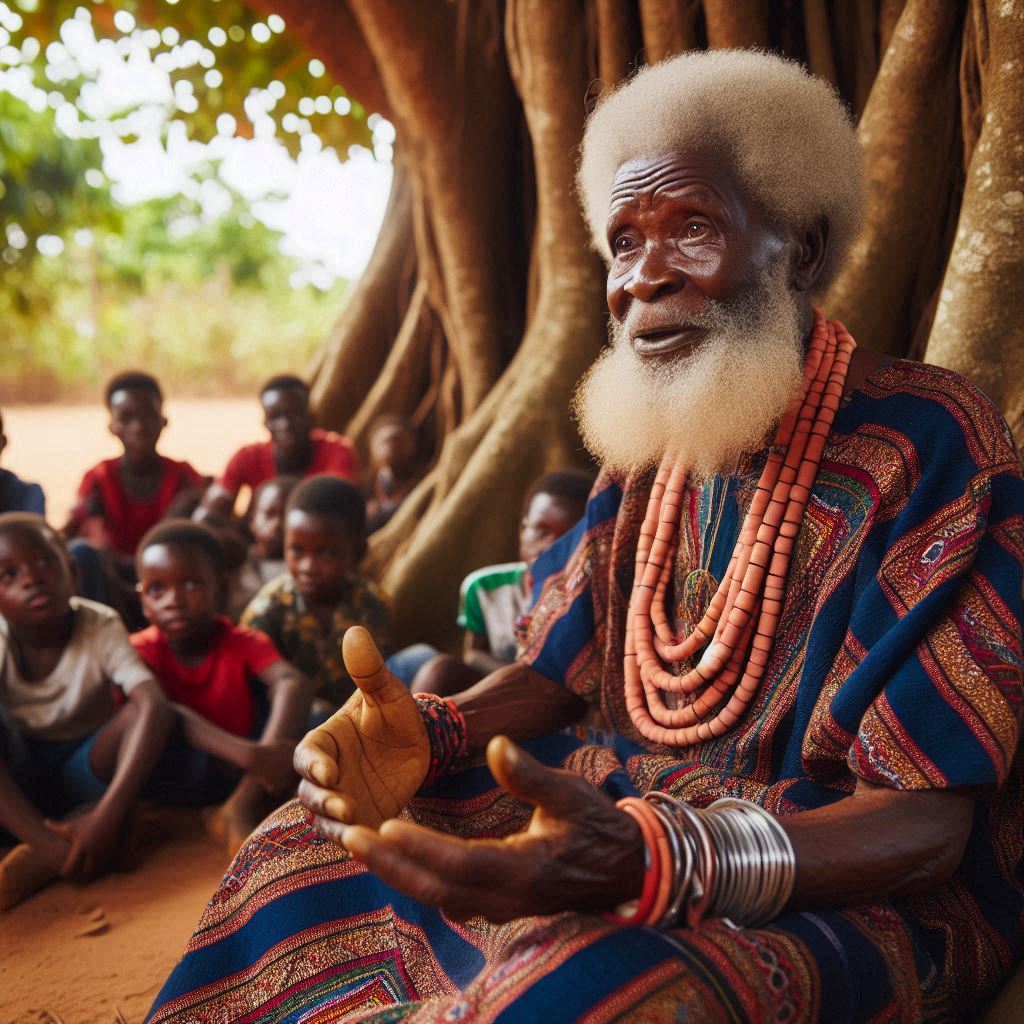Introduction
Language is a crucial part of cultural identity. In Nigeria, the diversity of languages is astonishing. Unfortunately, many indigenous languages are at risk of extinction.
This blog post aims to highlight the importance of language revitalization and showcase success stories in Nigeria.
The Concept of Language Revitalization in Nigeria
Language revitalization involves efforts to preserve and promote languages that are endangered or declining. In Nigeria, this is especially critical.
With over 500 languages spoken, many face the threat of extinction. Efforts to revitalize these languages include teaching them in schools and using them in media and literature. By doing this, communities hope to keep their cultural heritage alive.
The Significance of Preserving and Promoting Indigenous Languages
Indigenous languages carry the history and traditions of their people. Preserving them is essential for maintaining cultural diversity. When a language dies, we lose unique perspectives and knowledge.
Promoting these languages helps strengthen community identity and pride. It also supports educational and cognitive benefits for younger generations.
Purpose of Highlighting Success Stories
This blog post focuses on success stories in Nigerian language revitalization. By showcasing these stories, we hope to inspire further efforts.
These success stories demonstrate that with dedication, endangered languages can thrive again. They provide a blueprint for others to follow.
Success Story 1: The Revival of Yoruba
One notable success is the revitalization of the Yoruba language. Efforts include incorporating Yoruba into school curriculums. Local media also play a role by broadcasting in Yoruba.
Literature and music have embraced the language, making it more appealing to the youth. These combined efforts have significantly boosted the use of Yoruba among young people.
Success Story 2: Igbo Language Initiatives
Igbo language revitalization has seen remarkable progress. Igbo language schools and clubs are growing. Online platforms and apps now offer Igbo language learning resources. Social media campaigns promote the daily use of Igbo.
These initiatives are helping to rejuvenate the language among younger generations.
Success Story 3: The Efik Language Project
The Efik language, once endangered, is experiencing a revival. Community leaders initiated language workshops and cultural festivals. Schools in Efik-speaking regions now include the language in their curriculum.
Additionally, the Efik Bible translation has renewed interest in the language. These efforts have significantly increased the number of Efik speakers.
Overall, Language revitalization in Nigeria is crucial for preserving cultural heritage. The success stories of Yoruba, Igbo, and Efik languages show that revitalization is possible.
Through dedicated efforts, these languages are not only surviving but thriving. By continuing to support such initiatives, we can ensure the survival of Nigeria’s rich linguistic heritage.
Case Study 1: Yoruba Language Revitalization
Background of the Yoruba Language
The Yoruba language is one of the four major languages in Nigeria. It is primarily spoken in the southwestern region of Nigeria. This language boasts over 20 million native speakers.
The Yoruba people have a rich cultural heritage deeply rooted in their language. Traditionally, Yoruba served as a medium for oral traditions, music, and religious practices.
However, modernization and globalization posed a threat to its survival. Many young Yoruba people started adopting English as their primary language. This shift led to a decline in the usage and transmission of Yoruba.
Initiatives and Projects for Yoruba Language Preservation
Several initiatives have emerged to revitalize the Yoruba language. One significant project is the Yoruba Academy, established in 2007. The academy focuses on developing educational resources in Yoruba.
It also trains teachers to instruct students in Yoruba. Additionally, the Oyo State government launched the “Speak Yoruba” campaign. This campaign encourages people to use Yoruba in daily conversations.
Moreover, digital platforms like YorubaDictionary.com offer online language learning tools. These platforms make learning Yoruba accessible to the younger generation.
Furthermore, the University of Ibadan offers a degree program in Yoruba Language and Literature. This program attracts students passionate about preserving their language.
Another notable initiative is the Yoruba Language Center in Lagos. The center conducts workshops and seminars on Yoruba language and culture. It also collaborates with local media to produce Yoruba-language content.
Impact of Efforts on the Yoruba-speaking Community
These revitalization efforts have significantly impacted the Yoruba-speaking community. Firstly, there is an increased interest in learning and speaking Yoruba among young people.
Schools incorporating Yoruba into their curriculum have seen positive responses from students. Secondly, parents are more encouraged to speak Yoruba at home. This practice helps children maintain fluency in their native language.
Additionally, the media’s role in promoting Yoruba cannot be overstated. Yoruba-language programs on radio and television have gained popularity.
These programs help keep the language relevant in everyday life. Social media has also played a crucial role. Platforms like YouTube feature Yoruba content creators who engage audiences worldwide.
Furthermore, the cultural significance of Yoruba traditions is being re-emphasized. Festivals, songs, and stories in Yoruba are celebrated and preserved.
This renewed cultural pride strengthens community bonds. The Yoruba people now have a greater sense of identity and belonging.
Generally, the Yoruba language revitalization efforts have borne fruit. Initiatives by educational institutions, government, and media have been pivotal.
These efforts have revived interest and usage of the Yoruba language. As a result, the Yoruba-speaking community has experienced a cultural renaissance. This success story serves as an inspiration for other language revitalization efforts.
Read: How to Start a Private Psychology Practice in Nigeria
Case Study 2: Igbo Language Revitalization
Overview of the Igbo Language and Its Importance
The Igbo language, spoken by the Igbo people in Nigeria, holds significant cultural value. It is one of Nigeria’s major languages and is crucial for cultural identity.
Igbo has several dialects but shares a common linguistic foundation. The language conveys the rich history, traditions, and values of the Igbo people. It is also a medium for oral literature, folklore, and indigenous knowledge.
Programs and Campaigns for Revitalizing Igbo
Several initiatives have emerged to revitalize the Igbo language. The Society for the Promotion of Igbo Language and Culture (SPILC) leads many of these efforts.
SPILC organizes workshops, seminars, and cultural festivals promoting Igbo literacy. They produce educational materials and books in Igbo to encourage learning from an early age.
The Igbo Language Association (ILA) collaborates with schools and universities. They implement Igbo language curriculums and sponsor Igbo language competitions.
These competitions motivate students to learn and use the language actively. Additionally, the Nigerian government has introduced policies to promote indigenous languages, including Igbo, in primary and secondary education.
Success Stories and Outcomes
The Igbo language revitalization efforts have seen notable successes. One significant outcome is the increased enrollment in Igbo language courses in universities.
Institutions like the University of Nigeria, Nsukka, report higher student interest in Igbo studies. This trend ensures the training of future educators and language experts.
Community involvement has played a critical role. In Enugu State, local radio stations now broadcast in Igbo, reaching a wide audience.
These programs discuss various topics, including health, agriculture, and culture, all in Igbo. This approach has increased language usage and appreciation among younger generations.
Digital platforms have also contributed to success. Apps and websites offering Igbo language lessons are widely used. Platforms like “Speak Igbo” and “Igbo 101” provide accessible resources for learning the language.
These tools attract both native speakers and those in the diaspora, expanding the language’s reach.
The annual Igbo Cultural Festival is another milestone. This event celebrates Igbo heritage with traditional music, dance, and storytelling.
The festival draws large crowds, fostering a strong sense of community and cultural pride. Participants often leave more committed to preserving and promoting their language.
In general, the revitalization of the Igbo language shows promising progress. Through educational programs, community media, digital platforms, and cultural events, the Igbo language is experiencing a resurgence.
These initiatives have not only preserved the language but also reinforced its importance in contemporary Nigerian society. Continued efforts and support will ensure that the Igbo language thrives for future generations.
Read: Scholarships for Christian Religious Studies Students
Case Study 3: Hausa Language Revitalization
Introduction to the Hausa Language
The Hausa language is one of Nigeria’s most widely spoken languages. It is a Chadic language with over 40 million native speakers. Hausa holds significant cultural and historical importance in Nigeria and West Africa.
It serves as a lingua franca across diverse communities, facilitating communication and commerce. The language embodies the rich traditions, history, and values of the Hausa people.
Cultural Significance of the Hausa Language
The Hausa language is not just a means of communication but a vessel of culture. It carries the history, traditions, and customs of the Hausa people.
Festivals, music, folklore, and literature in Hausa reflect centuries-old traditions. The language also plays a crucial role in preserving oral histories and traditional knowledge.
Understanding and speaking Hausa connects individuals to their heritage and identity.
Strategies for Revitalizing the Hausa Language
Several strategies have been employed to revitalize and strengthen the Hausa language. Educational initiatives have been at the forefront of these efforts.
Introducing Hausa as a subject in schools has helped increase proficiency among younger generations. Universities offer Hausa language and literature programs to promote academic interest and research.
Community Involvement in Language Revitalization
Community-based initiatives have played a significant role in revitalizing Hausa. Language clubs and cultural associations organize events and workshops to encourage usage and learning.
Media platforms, including radio, television, and online content, broadcast in Hausa to reach a broader audience. These efforts ensure the language remains relevant and widely spoken.
Role of Technology in Language Revitalization
Technology has been a powerful tool in revitalizing the Hausa language. Mobile apps and online platforms offer language learning resources and interactive tools.
Social media has provided a space for speakers to connect, share, and promote the language. Digital archives and databases preserve and make accessible traditional Hausa texts and recordings.
Challenges in Promoting the Hausa Language
Despite these efforts, promoting the Hausa language faces several challenges. The dominance of English and other major languages in education and media is a significant barrier.
Urbanization and modernization have also led to the gradual erosion of traditional languages. There is often a lack of funding and resources for language revitalization programs.
Achievements in Hausa Language Promotion
Despite these challenges, significant achievements have been made. There has been an increase in the number of Hausa language learners and speakers.
The language has gained more presence in academic and cultural institutions. Media in Hausa has expanded, providing more content for speakers and learners. Community engagement has strengthened the sense of pride and identity among Hausa speakers.
In review, The revitalization of the Hausa language is a testament to the resilience and dedication of its speakers. Through education, community involvement, and technology, the Hausa language continues to thrive.
Despite challenges, the achievements made in promoting Hausa offer hope and inspiration. The ongoing efforts ensure that the language remains a vital part of Nigeria’s cultural heritage.
Read: Challenges in Teaching Christian Religious Studies

Comparison of Success Stories
Nigeria has seen significant successes in revitalizing its indigenous languages. Various communities have implemented effective strategies, showing promising results.
A key success story is the Yoruba Language Project. This initiative introduced Yoruba in primary school curriculums. Teachers received special training to enhance their teaching skills.
Similarly, the Igbo Language Project utilized media to promote language use. Radio stations began broadcasting in Igbo, reaching a vast audience. Another successful case is the Hausa Language Program.
This project focused on adult education, offering evening classes for adults.
Common Themes and Strategies
Successful language revitalization projects share common themes. Community involvement is a critical factor. Projects that actively engage community members often succeed.
For example, the Yoruba Language Project involved parents and local leaders. Another common strategy is the integration of language in education.
The Igbo Language Project incorporated the language into school subjects. Media usage is also a recurring theme. The Hausa Language Program used local radio to reach learners.
Impact of Government Support
Government support significantly impacts language revitalization efforts. In Nigeria, government-backed projects often see better outcomes.
The Yoruba Language Project received substantial government funding. This financial support allowed for extensive teacher training programs.
The Igbo Language Project benefited from policy changes. The government mandated the inclusion of Igbo in school curriculums. Government support also facilitated resource allocation.
The Hausa Language Program received government grants for educational materials. Overall, government involvement provides essential resources and legitimacy.
Best Practices for Replication
Several best practices have emerged from these success stories. First, community engagement is vital. Projects should involve community members in planning and execution.
This ensures cultural relevance and local support. Second, integrating language in education is crucial. Schools should include indigenous languages in their curriculums.
Teacher training programs are essential for effective implementation. Third, leveraging media can amplify reach. Broadcasting in indigenous languages helps normalize usage.
Lastly, government support is indispensable. Advocating for policy changes and funding is necessary.
Nigeria’s language revitalization efforts offer valuable lessons. Successful projects share common themes like community involvement and educational integration.
Government support plays a pivotal role in these successes. Best practices from these projects can guide future initiatives. By replicating these strategies, other Nigerian communities can revitalize their indigenous languages.
The journey of language revitalization is challenging but achievable. With the right strategies and support, Nigeria can preserve its rich linguistic heritage for future generations.
Read: Impact of Christian Religious Studies on Nigerian Society
Transform Your Career with Expert Guidance
Get personalized mentorship consulting that’s tailored to your unique path. Our expert advice is actionable and exclusive.
Get StartedSee Related Content: How to Create Unique Fashion Designs in Nigeria
Uncover the Details: Preparing for a Career in Media with English Studies
Uncover the Details: Key Economic Theories Explained for Nigerian Students
Learn More: Role of CRS in Promoting Nigerian Cultural Values
Challenges and Opportunities
Language revitalization efforts in Nigeria face numerous challenges that hinder their progress. One major obstacle is the dominance of English as the official language, which has led to the neglect of indigenous languages.
Additionally, the lack of resources and funding for language revitalization projects makes it difficult to sustain long-term efforts.
Furthermore, the rapid urbanization and globalization trends in Nigeria contribute to the erosion of traditional languages, as younger generations are more exposed to foreign languages and cultures.
This poses a threat to the transmission of indigenous languages from one generation to the next.
Opportunities for Collaboration and Partnership
Despite these challenges, there are opportunities for collaboration and partnership to promote indigenous languages in Nigeria.
One strategy is to form alliances with educational institutions and government agencies to incorporate indigenous languages into school curricula. This can help expose younger generations to their heritage languages from an early age.
Collaborating with community leaders and local organizations is another way to garner support for language revitalization projects.
By involving community members in the preservation and promotion of their languages, initiatives are more likely to be successful and sustainable in the long run.
Potential Solutions and Strategies
To overcome the challenges in sustaining language revitalization projects, several solutions can be implemented.
One approach is to establish language immersion programs that provide intensive training in indigenous languages for both children and adults.
Immersion programs help participants become fluent speakers and instill a sense of pride in their cultural heritage.
Another strategy is to create digital resources and online platforms that make indigenous languages more accessible to a wider audience.
These resources can include language learning apps, websites, and social media channels that promote the use of indigenous languages in daily communication.
Furthermore, involving indigenous language speakers in the development and implementation of language policies is crucial for the success of revitalization efforts.
Their input and expertise can ensure that initiatives are culturally relevant and reflect the linguistic diversity of Nigeria.
In a nutshell, while language revitalization projects in Nigeria face numerous challenges, there are opportunities for collaboration and partnership that can help promote and sustain indigenous languages.
By implementing innovative solutions and strategies, the preservation of indigenous languages can be achieved for generations to come.
You Might Also Like: English Language and Media Studies: Nigerian Perspective
Delve into the Subject: Nigerian Economic Policies and Their Impact
Explore Further: Exploring Nigeria’s Rich Artistic Heritage
Learn More: Technological Integration in African and Asian Studies
Future Prospects
The future of Nigerian language revitalization looks promising. Technology, education, and cultural pride are driving forces. Communities are increasingly aware of the importance of preserving their linguistic heritage.
Envisioning the Future of Nigerian Language Revitalization
Technology will play a crucial role in revitalizing Nigerian languages. Mobile apps and online resources will make language learning accessible to all. Social media platforms will facilitate the sharing of indigenous languages and cultures.
Education systems will incorporate more indigenous languages into their curricula. Early exposure to native languages will foster bilingualism and cultural awareness among young Nigerians. Schools and universities will offer courses and degrees in indigenous languages.
Community initiatives will continue to thrive. Grassroots organizations will promote language learning and usage through workshops, storytelling events, and cultural festivals. These initiatives will strengthen community bonds and foster a sense of pride in linguistic heritage.
Long-term Benefits of Promoting and Preserving Indigenous Languages
Promoting and preserving indigenous languages will yield significant long-term benefits. First, it will strengthen cultural identity and pride. Nigerians will feel a deeper connection to their heritage and history.
Second, it will enhance cognitive abilities. Studies show that bilingualism improves problem-solving skills, creativity, and mental flexibility. Nigerian children will benefit academically and personally from learning multiple languages.
Third, it will boost economic opportunities. Language skills are valuable in the global job market. Nigerians fluent in indigenous and international languages will have a competitive edge.
Fourth, it will foster social cohesion. Shared language strengthens community ties and promotes understanding and cooperation. Preserving indigenous languages will bring communities closer together.
Importance of Continued Support and Investment
Continued support and investment in language revitalization initiatives are crucial. Governments must allocate resources for language education and preservation projects. Policies should encourage the use of indigenous languages in public and private sectors.
Private organizations can play a vital role. Businesses can sponsor language programs, cultural events, and media content in indigenous languages. Collaboration with communities will ensure initiatives are culturally appropriate and effective.
Non-governmental organizations (NGOs) should continue to support language revitalization. They can provide funding, resources, and expertise to grassroots initiatives. International partnerships can also bring valuable insights and support.
In fact, The future of Nigerian language revitalization is bright. With continued support, investment, and innovative approaches, indigenous languages will thrive. This will benefit individuals, communities, and the nation as a whole.
Promoting and preserving Nigerian languages is an investment in cultural heritage and future generations. It is a commitment to diversity, identity, and unity. The journey requires collective effort, but the rewards are immense and lasting.
Uncover the Details: Mass Communication Practicals: What to Expect Nigeria
Learn More: Economic History and Strategic Studies in Nigeria
You Might Also Like: Tips for Marketing Your Fashion Brand in Nigeria
Discover More: Role of Technology in Security Studies in Nigeria
Conclusion
Language revitalization is crucial for preserving Nigeria’s rich cultural heritage. By protecting and promoting local languages, we ensure the survival of traditions, stories, and knowledge for future generations.
Let’s summarize the key points discussed in this blog post and reinforce the significance of our collective efforts.
Key Points Summarized
We explored various success stories in Nigerian language revitalization. These case studies highlighted community-driven efforts, innovative educational programs, and governmental initiatives that have made a significant impact.
Firstly, we looked at community-driven efforts. In these initiatives, local communities have taken charge. They organize language classes, cultural events, and storytelling sessions to revive their native tongues.
These grassroots movements have shown that community involvement is vital.
Secondly, we discussed innovative educational programs. Schools and universities are incorporating indigenous languages into their curricula.
Technology plays a big role here. Mobile apps, online courses, and interactive platforms make learning accessible and engaging. These modern tools are helping young Nigerians reconnect with their linguistic roots.
Thirdly, we examined governmental initiatives. The Nigerian government has introduced policies to promote language learning. They have funded projects aimed at documenting endangered languages.
These efforts ensure that linguistic diversity is preserved for future generations.
Significance of Language Revitalization
Language revitalization is not just about communication. It’s about preserving a way of life. Each Nigerian language carries unique cultural, historical, and social significance.
When a language dies, we lose a part of our heritage. Revitalizing these languages means keeping our stories, traditions, and identity alive.
Moreover, language is a key aspect of personal and community identity. Speaking one’s native language fosters a sense of belonging and pride. It strengthens community bonds and ensures that cultural practices are passed down.
Encouragement for Active Participation
We all have a role to play in language revitalization. You can start by learning and speaking your native language. Teach it to your children, friends, and community members.
Support local initiatives that promote language learning. Participate in cultural events and encourage others to do the same.
You can also leverage technology. Use mobile apps and online resources to learn and practice Nigerian languages. Share these tools with others. The more people engage, the stronger our collective impact will be.
Finally, advocate for policies that support language revitalization. Voice your support for educational reforms that include indigenous languages.
Encourage the government to fund documentation and preservation projects. Your advocacy can make a difference.
In closing, the revitalization of Nigerian languages is a collective responsibility. By learning, teaching, and advocating, we can ensure that our linguistic heritage thrives.
Let’s celebrate the successes we’ve seen and commit to furthering these efforts. Together, we can preserve Nigeria’s rich cultural tapestry for generations to come. Your participation matters, and every effort counts.




